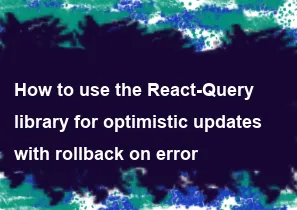How to use the React-Query library for optimistic updates with rollback on error

React-Query is a powerful library for managing server state in React applications. It provides features like caching, fetching, and updating data from a remote server. Optimistic updates with rollback on error can be achieved using React-Query's useMutation hook along with optimistic updates.
Here's a step-by-step guide on how to use React-Query for optimistic updates with rollback on error:
- Install React-Query: First, install React-Query in your project:
bashnpm install react-query
- Import Dependencies: Import the necessary functions and hooks from React-Query:
javascriptimport { useMutation, queryCache } from 'react-query';
- Define Mutation Function: Define a mutation function that will perform the optimistic update and make the actual request to the server:
javascriptconst updateUser = async (userData) => {
const updatedUserData = /* perform optimistic update */;
try {
// Make request to update user data
const response = await fetch('/api/users', {
method: 'PUT',
body: JSON.stringify(updatedUserData),
headers: {
'Content-Type': 'application/json',
},
});
if (!response.ok) {
throw new Error('Failed to update user');
}
return await response.json();
} catch (error) {
// Rollback optimistic update on error
throw new Error('Rollback');
}
};
- Use Mutation Hook: Use the
useMutationhook to define the mutation in your component:
javascriptconst EditUserForm = ({ userId, initialValues }) => {
const [mutate] = useMutation(updateUser, {
// Invalidate related queries after mutation
onSuccess: () => {
queryCache.invalidateQueries(['user', userId]);
},
// Rollback on error
onError: (error, variables, rollback) => {
if (error.message === 'Rollback') {
rollback();
}
},
});
const handleSubmit = async (values) => {
try {
await mutate(values);
} catch (error) {
console.error('Mutation failed:', error);
}
};
return (
<form onSubmit={handleSubmit}>
{/* Form fields */}
</form>
);
};
In the above code:
- The
useMutationhook is used to define the mutation. It takes theupdateUserfunction and an options object. - The
onSuccesscallback is called after a successful mutation. In this example, it invalidates the related query in the cache. - The
onErrorcallback is called if the mutation encounters an error. If the error is due to a rollback, therollbackfunction is called to revert the optimistic update. - In the
handleSubmitfunction, themutatefunction is called to perform the mutation.
With this setup, React-Query will handle optimistic updates for you and automatically rollback the changes if an error occurs during the mutation process.
-
Popular Post
- How to optimize for Google's About This Result feature for local businesses
- How to implement multi-language support in an Express.js application
- How to handle and optimize for changes in mobile search behavior
- How to handle CORS in a Node.js application
- How to use Vue.js with a UI framework (e.g., Vuetify, Element UI)
- How to configure Laravel Telescope for monitoring and profiling API requests
- How to create a command-line tool using the Commander.js library in Node.js
- How to implement code splitting in a React.js application
- How to use the AWS SDK for Node.js to interact with various AWS services
- How to use the Node.js Stream API for efficient data processing
- How to implement a cookie parser middleware in Node.js
- How to implement WebSockets for real-time communication in React
-
Latest Post
- How to implement a dynamic form with dynamic field styling based on user input in Next.js
- How to create a custom hook for handling user interactions with the browser's device motion in Next.js
- How to create a custom hook for handling user interactions with the browser's battery status in Next.js
- How to implement a dynamic form with dynamic field visibility based on user input in Next.js
- How to implement a dynamic form with real-time collaboration features in Next.js
- How to create a custom hook for handling user interactions with the browser's media devices in Next.js
- How to use the useSWRInfinite hook for paginating data with a custom loading indicator in Next.js
- How to create a custom hook for handling user interactions with the browser's network status in Next.js
- How to create a custom hook for handling user interactions with the browser's location in Next.js
- How to implement a dynamic form with multi-language support in Next.js
- How to create a custom hook for handling user interactions with the browser's ambient light sensor in Next.js
- How to use the useHover hook for creating interactive image zoom effects in Next.js